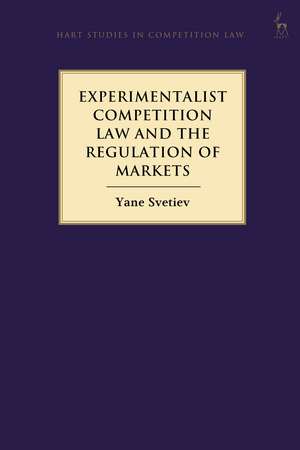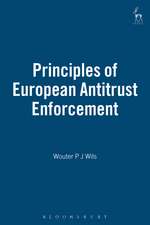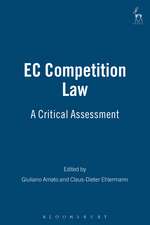Experimentalist Competition Law and the Regulation of Markets: Hart Studies in Competition Law
Autor Yane Svetieven Limba Engleză Paperback – 15 iun 2022
| Toate formatele și edițiile | Preț | Express |
|---|---|---|
| Paperback (1) | 250.09 lei 6-8 săpt. | |
| Bloomsbury Publishing – 15 iun 2022 | 250.09 lei 6-8 săpt. | |
| Hardback (1) | 539.49 lei 6-8 săpt. | |
| Bloomsbury Publishing – 25 noi 2020 | 539.49 lei 6-8 săpt. |
Din seria Hart Studies in Competition Law
- 30%
 Preț: 956.51 lei
Preț: 956.51 lei - 21%
 Preț: 275.26 lei
Preț: 275.26 lei - 18%
 Preț: 313.74 lei
Preț: 313.74 lei - 18%
 Preț: 313.07 lei
Preț: 313.07 lei -
 Preț: 315.54 lei
Preț: 315.54 lei - 22%
 Preț: 270.75 lei
Preț: 270.75 lei - 30%
 Preț: 540.54 lei
Preț: 540.54 lei - 27%
 Preț: 777.24 lei
Preț: 777.24 lei - 14%
 Preț: 893.15 lei
Preț: 893.15 lei - 30%
 Preț: 539.18 lei
Preț: 539.18 lei - 21%
 Preț: 217.35 lei
Preț: 217.35 lei -
 Preț: 365.91 lei
Preț: 365.91 lei - 22%
 Preț: 238.22 lei
Preț: 238.22 lei - 30%
 Preț: 779.09 lei
Preț: 779.09 lei - 18%
 Preț: 313.46 lei
Preț: 313.46 lei - 22%
 Preț: 261.17 lei
Preț: 261.17 lei - 23%
 Preț: 255.76 lei
Preț: 255.76 lei - 18%
 Preț: 299.96 lei
Preț: 299.96 lei - 21%
 Preț: 235.29 lei
Preț: 235.29 lei - 18%
 Preț: 322.05 lei
Preț: 322.05 lei - 30%
 Preț: 894.38 lei
Preț: 894.38 lei - 22%
 Preț: 780.23 lei
Preț: 780.23 lei - 30%
 Preț: 539.57 lei
Preț: 539.57 lei - 24%
 Preț: 189.80 lei
Preț: 189.80 lei - 30%
 Preț: 837.39 lei
Preț: 837.39 lei -
 Preț: 319.13 lei
Preț: 319.13 lei - 22%
 Preț: 251.65 lei
Preț: 251.65 lei - 30%
 Preț: 569.22 lei
Preț: 569.22 lei - 30%
 Preț: 961.39 lei
Preț: 961.39 lei - 27%
 Preț: 1136.75 lei
Preț: 1136.75 lei
Preț: 250.09 lei
Preț vechi: 322.28 lei
-22% Nou
Puncte Express: 375
Preț estimativ în valută:
47.86€ • 49.78$ • 39.51£
47.86€ • 49.78$ • 39.51£
Carte tipărită la comandă
Livrare economică 15-29 aprilie
Preluare comenzi: 021 569.72.76
Specificații
ISBN-13: 9781509945504
ISBN-10: 1509945504
Pagini: 232
Dimensiuni: 156 x 234 mm
Greutate: 0.32 kg
Editura: Bloomsbury Publishing
Colecția Hart Publishing
Seria Hart Studies in Competition Law
Locul publicării:London, United Kingdom
ISBN-10: 1509945504
Pagini: 232
Dimensiuni: 156 x 234 mm
Greutate: 0.32 kg
Editura: Bloomsbury Publishing
Colecția Hart Publishing
Seria Hart Studies in Competition Law
Locul publicării:London, United Kingdom
Caracteristici
The author takes a truly innovative approach to examine of the implementation of EU competition law through the prism of experimentalism governance.
Notă biografică
Yane Svetiev is Associate Professor at University of Sydney Law School.
Cuprins
Introduction I. Transformation of EU Competition Law: From Cross-border Transactions to Economic Efficiency? II. A New Equilibrium for EU Competition Law: Legalism or Regulation? III. The Status of Competition in the EU Internal Market: Competitive Markets and Public Interest Objectives IV. Competition Law and Experimentalist Governance V. The Scope Conditions for Experimentalist Governance in Competition Law 1. Networks and Hierarchy: Completing an Experimentalist Architecture? I. The ECN as a Convergence Network? II. Detecting Experimentalism in Light of Institutional Ambiguity III. Enforcement Institutions, Techniques and Procedures IV. Substantive Competition Law: Shadowing the Commission or Innovating? V. Experimentalism and Institutional Design VI. Conclusion 2. Experimentalism and the Choice of Enforcement Technique I. From Rule-Enforcement to Problem-Solving in Market Regulation II. The Transformation of EU Competition Enforcement: Legalism or Experimentalism? III. The Use of Commitments in EU Competition Enforcement IV. Commitment Decisions and Experimentalism V. Experimentalism and the Choice of Enforcement Technique VI. Conclusion 3. Peer Review in Experimentalist Market Regulation I. The Forms and Functions of Peer Review II. Formalising Peer Review in EU Market Regulation III. Transformation and Assemblage: Experimentalist Peer Review in Competition Law? IV. Conclusion 4. Courts and Experimentalist Competition Governance I. Judicial Review of Competition Decision-Making II. Dialogic Review: Judicial Review and Peer Accountability III. Private Antitrust Litigation and Experimentalist Governance IV. Conclusion 5. Experimentalist Governance and International Antitrust I. Globalising Competition Law and Policy II. An Informal Competition Network: A Stepping Stone to Experimentalism? III. The ICN in its Second Decade: A Focus on Implementation IV. Transnational Peer Review in Competition Law and Policy V. Experimentalism and Shared Enforcement Context VI. Conclusion ConclusionI. From Spontaneous Workarounds to Deliberate Experimentalism II. Experimentalist Governance: Prospects, Limits and Constraints











